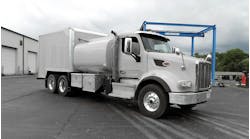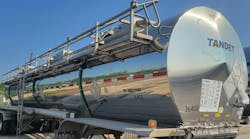Although it is expressing support for a federal proposal to improve rail tank car safety, the National Association of Chemical Distributors (NACD) is concerned about the increased costs, disruptions of commerce, and increased exposure to security risks that it believes would result from some of the plans.
NACD has voiced its concern in comments to the Federal Railroad Administration about the proposal to require a maximum speed limit of 30 mph for railcars hauling poison inhalation (PIH) materials that do not yet meet new performance standards and are operating in non-signaled territory.
“There is no guaranty that this proposal would increase safety, but it would certainly increase security risks," NACD argued. "The proposal is contrary to the important objective of having these materials in transit for as short of a time period as possible. It would be much easier for a terrorist to track and target a train moving at 30 mph than to track one moving at 50 or 60 mph. At a time when stringent new regulations to increase security at fixed chemical facilities are being implemented, it would be particularly risky to increase the security exposure of PIH materials on the rails."
The other major concern NACD raises in the comments is the limited eight-year time frame for the mandatory replacement of all PIH tank cars to meet the new standards. "Such a short time frame could prematurely remove a significant number of tank cars from the service of transporting PIH materials," NACD said in its comments. "This would exacerbate the problem of a lack of shipping capacity for these critical materials and further raise prices for the vast majority of consumer goods on top of the increases already caused by skyrocketing fuel costs.”
The Pipeline and Hazardous Materials Safety Administration (PHMSA) is proposing enhanced tank car performance standards for head and shell impacts; operational restrictions for trains hauling tank cars containing poison inhalation hazmat; interim operational restrictions for trains hauling tank cars containing those materials, but not meeting the enhanced performance standards; and an allowance to increase the gross weight of tank cars that meet the enhanced tank-head and shell puncture-resistance requirements.








